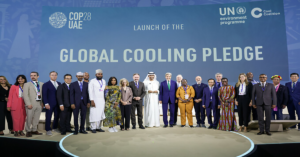Physical Address
23,24,25 & 26, 2nd Floor, Software Technology Park India, Opp: Garware Stadium,MIDC, Chikalthana, Aurangabad, Maharashtra – 431001 India
Physical Address
23,24,25 & 26, 2nd Floor, Software Technology Park India, Opp: Garware Stadium,MIDC, Chikalthana, Aurangabad, Maharashtra – 431001 India

Introduction:
As temperatures soar worldwide, the demand for cooling solutions, especially air conditioners, is reaching unprecedented levels. In a groundbreaking move, a recent United Nations report, unveiled at COP28 climate talks in Dubai on December 5th, charts a transformative course to slash emissions in the global cooling sector. This not only aligns with climate goals but also sets the stage for achieving universal access to life-saving cooling, easing strain on energy grids, and saving trillions of dollars by 2050.
The High Stakes of Cooling:
With over 60 nations committing to a ‘cooling pledge,’ the report addresses the critical need to mitigate the climate impact of the cooling sector. The urgency arises from the alarming fact that more than a billion people, primarily in Africa and Asia, face high risks due to extreme heat linked to inadequate cooling access. Nearly one-third of the global population contends with deadly heatwaves exceeding 20 days annually. Striking a balance between cooling benefits and environmental impact is crucial, considering that conventional cooling, like air conditioning, contributes over seven percent of global greenhouse gas emissions.
Cooling Conundrum:
While cooling systems offer respite, the conventional methods, particularly air conditioners and refrigerators, are energy-intensive culprits contributing to global warming. The report underscores that adopting measures to reduce the power consumption of cooling equipment could result in a substantial 60 percent reduction in predicted 2050 sectoral emissions. The paradox is clear – as we strive to keep cool, we inadvertently intensify the planet’s heat. If present trends persist, cooling equipment’s share in total electricity consumption is poised to double by 2050.
Global Cooling Pledge:
The report aligns with the ‘Global Cooling Pledge,’ a collaborative effort between the United Arab Emirates, host of COP28, and the UNEP-led ‘Cool Coalition.’ It prescribes actionable strategies, emphasizing passive cooling approaches like insulation, natural shading, ventilation, and reflective surfaces. Additionally, the report calls for higher energy efficiency standards and a rapid phase-down of climate-warming hydrofluorocarbon (HFC) refrigerants.
Key Takeaways:
Implementing the report’s recommendations could yield transformative benefits:
Empowering Billions: Enabling an additional 3.5 billion people to access refrigerators, air conditioners, or passive cooling solutions by 2050.
Economic Impact: Reducing electricity bills for end-users by a staggering US$1 trillion in 2050 and cumulatively saving US$17 trillion between 2022 and 2050.
Energy Efficiency: Slashing peak power requirements by 1.5 to 2 terawatts (TW), nearly double the EU’s current total generation capacity.
Financial Savings: Avoiding power generation investments in the ballpark of $4 to $5 trillion.
Conclusion:
The UN report signals a pivotal moment in our quest for sustainable cooling solutions. By steering away from conventional cooling practices and embracing a greener approach, we not only mitigate climate impact but also usher in a future where cooling is accessible, affordable, and eco-friendly. It’s a roadmap towards a cooler world that doesn’t compromise the health of our planet.